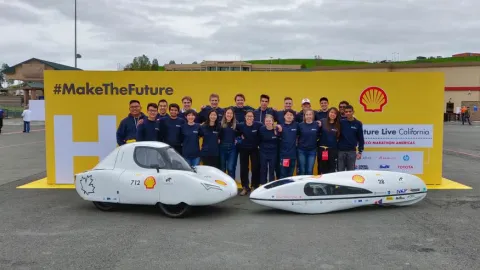UBC Supermileage takes the podium at Shell Eco-marathon Americas 2019

UBC Supermileage — a group of 80 engineering students with a passion for designing and building energy-efficient vehicles — placed second in their category in the Americas arm of this year's Shell Eco-marathon, one of the world’s leading energy efficiency competitions for students.
Their vehicle, which competed in the category for prototype vehicles powered by internal combustion engines, travelled 1371.6 miles on one gallon of gas — the team’s best-ever showing in the prototype class at the event, which it has been attending for several years.
First place in the category went to a group from Northern Illinois University, whose vehicle travelled 1524.9 miles on a single gallon.
“Projects like these really put your creativity and problem-solving ability to the test, and we’re very proud of what we achieved,” says UBC Supermileage co-captain Cecilia Liu, a fourth-year integrated engineering student and a mechanical product developer at Intuitive AI. “It’s always gratifying to see something you worked hard on over a long period of time do well in the end.”
Over 1,000 students from 88 high schools and universities across North, Central and South America participated in this year’s Americas competition, which took place over four days at the Sonoma Raceway in Sonoma, California. Participants competed in two vehicle classes (Prototype or UrbanConcept) and three energy categories: hydrogen fuel cell, battery electric and internal combustion engine (gasoline or diesel).
In the Prototype class, teams were given only a few technical design limitations, allowing them to focus on achieving ultra-energy efficiency and driver safety. UrbanConcept vehicles, on the other hand, were required to balance energy efficiency with the familiar features of road-ready vehicles, including an upright driver’s compartment, side-opening doors, trunk space and hydraulic brakes.
This year, UBC Supermileage intended to compete in the battery electric UrbanConcept category for the first time. However, despite passing a rigorous technical inspection by the Shell Eco-marathon Tech Team — a notable accomplishment in itself — their vehicle developed electrical system issues that, despite the team’s best efforts, rendered it unable to complete a valid run.
"Competition is a high-stress environment where time and resources are limited, and it was great to see our team step up in the face of adversity and still accomplish such remarkable results," said Jordan Fong, a UBC Supermileage co-captain and fourth-year mechanical engineering student.
Founded in 2001 by two MECH students, UBC Supermileage offers budding engineers an opportunity to develop highly interdisciplinary, practical skills in a variety of areas, including mechanical and electrical design, aerodynamic simulation, composites fabrication and project management. Team members have received co-op placements with Ford, Tesla, Nokia, Avcorp, VTech, Teleflex, the Canadian Space Agency and many other top companies and organizations.
The team first competed in the gasoline internal combustion engine UrbanConcept category at the Shell Eco-marathon in 2010 and in the Prototype category in 2013. Originally conceived in 1939 as a friendly challenge among scientists in a Shell research lab, the Eco-marathon is now an international event that aims “to offer students hands-on opportunities to develop ideas and technology, knowledge and skills, within an arena of competition.” It is held annually in Asia and Europe in addition to the Americas.
Liu, Fong and their teammates are currently optimizing their prototype vehicle in preparation for another major energy efficiency event: the Society of Automotive Engineers (SAE) Supermileage Competition, where they will face off against 30 teams from around the world. At last year's SAE competition, the team placed third, with 1407 miles per gallon, and received the award for best design execution.
“This summer, we’ll also be working to diagnose and remedy the issues that our battery electric UrbanConcept vehicle faced at the Eco-marathon,” says Liu. “And over the next two years, we plan to further transition towards sustainable energy sources by pursuing a hydrogen fuel cell vehicle.”